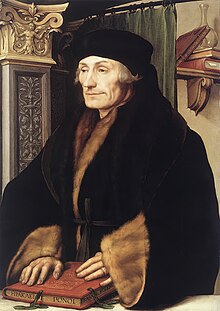Erasmus von Rotterdam
| Erasmus | |
|---|---|

|
|
| Born | c. 28 October 1466 Rotterdam or Gouda, Burgundian Netherlands |
| Died | 12 July 1536 (aged 69) Basel, Old Swiss Confederacy |
| Other names | Desiderius Erasmus Roterodamus, Erasmus of Rotterdam |
| Alma mater |
Queens' College, Cambridge Collège de Montaigu, Paris University of Turin |
| Era | Renaissance philosophy |
| Region | Western philosophy |
| Institutions | University of Leuven |
|
Main interests
|
Christian philosophy Renaissance humanism |
|
Notable ideas
|
Erasmian pronunciation |
|
Influenced
|
|
Desiderius Erasmus Roterodamus (/ˌdɛzɪˈdɪəriəs ɪˈræzməs/; 28 October 1466 – 12 July 1536), known as Erasmus or Erasmus of Rotterdam, was a Dutch Renaissance humanist, Catholic priest, social critic, teacher, and theologian.
Erasmus was a classical scholar and wrote in a pure Latin style. Among humanists he enjoyed the sobriquet "Prince of the Humanists", and has been called "the crowning glory of the Christian humanists". Using humanist techniques for working on texts, he prepared important new Latin and Greek editions of the New Testament, which raised questions that would be influential in the Protestant Reformation and Catholic Counter-Reformation. He also wrote On Free Will,The Praise of Folly, Handbook of a Christian Knight, On Civility in Children, Copia: Foundations of the Abundant Style, Julius Exclusus, and many other works.
...
Wikipedia
